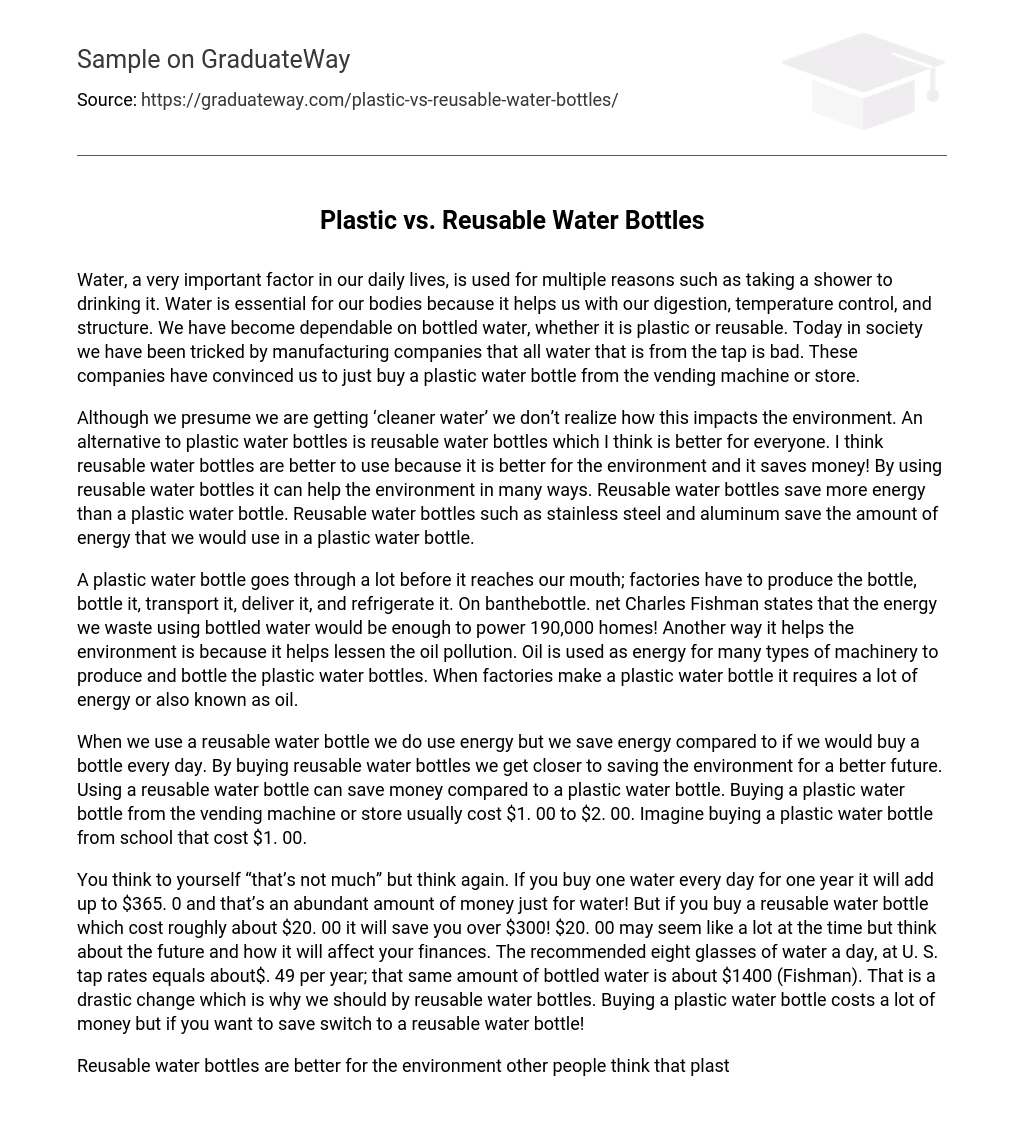Water plays a vital role in various aspects of our daily lives, such as bathing and maintaining hydration. It serves important purposes within our bodies, including assisting with digestion, regulating body temperature, and providing structural support. Regrettably, we have increasingly relied on bottled water, regardless of whether it is packaged in plastic or reusable containers. Tragically, manufacturers have misled society into incorrectly perceiving tap water as inherently dangerous. Consequently, we have been persuaded to solely rely on vending machines or stores when purchasing bottled water.
Although we assume we are receiving ‘cleaner water’, we may not fully comprehend the environmental repercussions. An alternative to plastic water bottles is the use of reusable ones, which in my opinion, is advantageous for everyone. I believe that opting for reusable water bottles is a superior choice as it benefits the environment and leads to cost savings. By utilizing reusable water bottles, various positive impacts on the environment can be observed. For instance, they conserve more energy compared to plastic water bottles. Examples of reusable water bottles like stainless steel and aluminum help reduce the energy consumption associated with plastic alternatives.
Charles Fishman, on banthebottle.net, states that a plastic water bottle goes through various stages before being consumed. These stages include manufacturing, bottling, transportation, delivery, and refrigeration. Fishman adds that the energy wasted from using bottled water could power 190,000 homes. Furthermore, the use of these bottles aids in reducing oil pollution since oil serves as an energy source during production and bottling of plastic water bottles. Consequently, producing plastic water bottles necessitates a substantial amount of energy or oil.
Using a reusable water bottle not only helps protect the environment but also conserves energy. Although some energy is still used, it is considerably less compared to when buying a new bottle every day. Moreover, using a reusable water bottle is more cost-effective since purchasing a plastic one usually costs between $1.00 and $2.00. For example, at school, you may have to spend $1.00 for a plastic water bottle.
Consider the implications of purchasing a single water bottle before disregarding its cost. Spending just $1 on water each day for a year equals $365, which is a significant expense for water alone. However, buying a reusable water bottle, typically priced at around $20, can save you over $300 in the long run. Although it may initially appear as a substantial expenditure, it’s crucial to acknowledge the positive impact it will have on your finances in the future.
Comparing the costs between tap water and bottled water, consuming eight glasses per day only costs about $0.49 annually with U.S. tap rates. Conversely, drinking the same amount of bottled water would cost approximately $1400 (Fishman). This clear contrast underscores why opting for reusable water bottles is highly recommended. By making this change, not only do you save money but also contribute to reducing plastic waste.
Therefore, if you want to make wise financial decisions while aiding the environment, it’s time to abandon purchasing single-use plastic water bottles and switch to using reusable ones!
Although there are arguments supporting the superior water quality and reduced carbon footprint of plastic water bottles, reusable water bottles are generally considered to be more environmentally friendly. Nestle Waters CEO, Mr. Jeffrey, agrees that plastic water bottles have a smaller carbon footprint; however, this view is only partially true. While it does require more energy to manufacture metal containers, the overall energy consumption needed for producing the large number of plastic water bottles made each year eventually exceeds that of reusable metal water bottles.
Factories mislead consumers by advertising the false notion that plastic water bottle water is cleaner or of superior quality. However, this belief is unfounded. All water comprises two hydrogen atoms and one oxygen atom. Despite potential contamination, both factories and tap water undergo purification processes. It is important to note that plastic water bottles do not possess any advantages, making reusable water bottles a better option. Reusable water bottles have various uses, contribute to environmental well-being, and provide cost savings.
Reusable water bottles are beneficial for the environment as they require less energy and oil during production compared to plastic water bottles. Additionally, using a metal water bottle and refilling it can save money compared to purchasing multiple plastic water bottles daily. While the impact may not seem significant presently, it will make a crucial difference in the future if we are not careful with our water bottle consumption.





